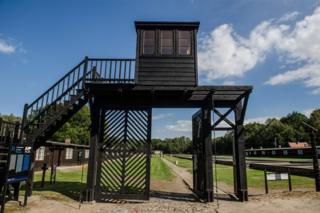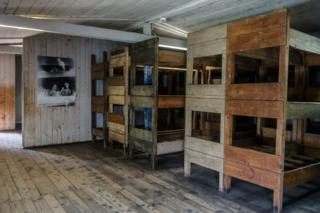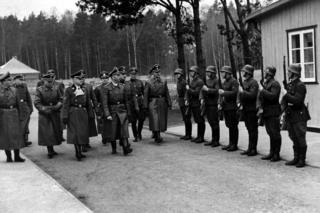 Image copyright EPA Image caption The face of the defendant, seen here in court, has been obscured by court order
Image copyright EPA Image caption The face of the defendant, seen here in court, has been obscured by court order
A former SS guard has gone on trial in Germany accused of complicity in mass murder at a Nazi death camp during World War Two.
Identified as Johann Rehbogen, the 94-year-old served in the Stutthof camp in what is now northern Poland from June 1942 to September 1944.
He denies knowing anything about atrocities committed there.
Because he was not yet aged 21, he is being tried in a juvenile court in Münster, western Germany.
US deports Nazi camp guard to Germany The hidden graves of the Holocaust Auschwitz inmate’s notes from hell finally revealed The Holocaust year by year
The former guard, who uses a wheelchair, faces a sentence of 15 years if convicted but is unlikely to serve any time in prison because of his advanced age.
 Image copyright AFP Image caption Stutthof has been preserved as a museum
Image copyright AFP Image caption Stutthof has been preserved as a museum  Image copyright AFP Image caption Crematorium at Stutthof
Image copyright AFP Image caption Crematorium at Stutthof  Image copyright AFP Image caption Bunks for inmates at Stutthof
Image copyright AFP Image caption Bunks for inmates at Stutthof
The defendant is “accused in his capacity as a guard of participating in the killing operations”, said Mr Brendel.
It has still to be determined whether the other former SS guard is fit to stand trial.
What was Stutthof?
 Image copyright Stutthof Museum Image caption SS leader Heinrich Himmler (centre) visited Stutthof
Image copyright Stutthof Museum Image caption SS leader Heinrich Himmler (centre) visited Stutthof
Located near the city of Danzig (now Gdansk), it was originally an internment camp before being officially designated a concentration camp in 1942.
From June 1944, prisoners were murdered in a gas chamber.
More than 65,000 people died in Stutthof before it was liberated by the Soviet Army on 9 May 1945.
Who is the defendant?
Johann Rehbogen was captured by the US Army after the war but returned to civilian life, working as a landscape architect for the North Rhine-Westphalia state authorities.
Questioned by police last year, he denied knowing about atrocities in the camp. Although he was not named by the court in Münster, his name has been published by the Wiesenthal Center, which investigates Nazi war crimes.
“If one looks at how many evil doings and crimes were perpetuated, one can understand why elderly people too have to face prosecution,” said Mr Brendel.
“Germany owes it to the families and victims to prosecute these Nazi crimes even today. That is a legal and moral question.”
How do survivors regard the trial?
Relatives of those murdered at Stutthof are attending the trial. Among them is one of the plaintiffs, Ben Cohen, whose grandmother Judy Meisel is a survivor of the camp.
He told the BBC it was good for her to see Germany pursue the case.
“Her being able to witness even some of this process, even from afar, is a sense of closure,” he said.
“To have Germany listening to her is very powerful for her.
“I speak to her all the time and I can see a new perspective that this gives her on things, so that could maybe be considered a form of closure. But closure is a difficult word in this context.”






